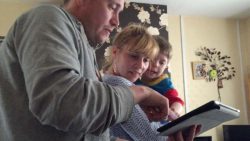This Horizon project builds on the EPSRC CharIoT project, in which we have developed an Internet of Things (IoT) energy kit for the Centre for Sustainable Energy (CSE). CSE is a charity that provides advice, especially to households in fuel poverty – a major societal problem affecting ~4.5M people in the UK alone. Energy advisors suffer from a paucity of data regarding property and lifestyle, inhibiting effective advice. The CharIoT Energy Kit  comprises an IoT sensor kit (wireless humidity, temperature, electricity and gas sensors and interactive apps) and, crucially, an effective use process to enable data collection and analysis to diagnose and mitigate fuel poverty issues such as damp, mould, cold homes, and unaffordable energy bills.
comprises an IoT sensor kit (wireless humidity, temperature, electricity and gas sensors and interactive apps) and, crucially, an effective use process to enable data collection and analysis to diagnose and mitigate fuel poverty issues such as damp, mould, cold homes, and unaffordable energy bills.
The objective of this project is to develop the existing Chariot Energy Kit from a research prototype into something more akin to an (early stage) product. This will enable stakeholders (energy advisors, housing associations, councils, property owners etc.) to deploy and effectively use the Energy Kit at scale to make sense of and inform how to improve energy performance of homes. In order to achieve this objective, we will conduct user-driven development of the Chariot 2.0 toolkit, which involves improving the existing kit, and developing new data analytics capabilities.
The project team consists of members both in the School of Computer Science at the University of Nottingham and the Agents, Complexity and Interactions Group at the University of Southampton. The team in Nottingham will lead the work on improvements to both hardware and software of the existing kit in order to enable third parties to easily deploy and host their own instance. The team in Southampton will work on providing data analytics capabilities such as predicting the impact of temperature changes on cost, and anomaly detection, for example to alert energy advisors about anomalous property conditions.
In parallel to this project, we have also been awarded EPSRC Impact Accelerator funds to begin making the CharIoT Energy Kit widely available to potential beneficiaries such as charities, housing associations, councils, and their clients (e.g., vulnerable tenants).














